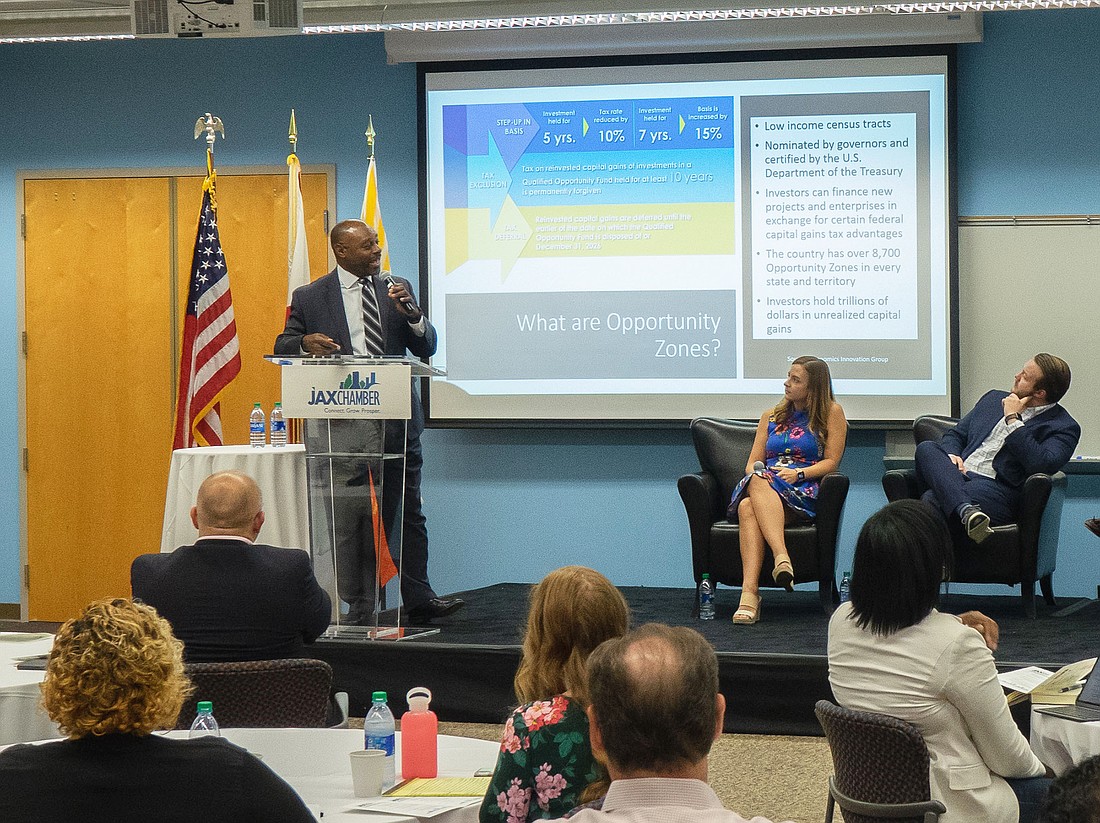
Investors can benefit most if they invest in an Opportunity Zone by the end of 2019, said Jim Carras, principal of Carras Community Investment on Thursday.
Opportunity Zones, created as part of the Tax Cuts and Jobs Act of 2017, offer tax breaks designed to spur economic development in economically distressed areas.
For investors to gain the maximum tax break of 15%, the investment must be held for seven years and be completed by 2026. If the investment is held for five years, the tax exclusion is 10%.
Carras and more than 100 local business leaders, investors and developers gathered at JAXUSA’s Opportunity Zones Conference and Marketplace at Florida State College at Jacksonville’s Downtown campus to learn about the program.
To invest in a property within an Opportunity Zone, investors must first set up a Qualified Opportunity Fund. Taxes on those funds can be deferred until 2026 or when the funds are used for development, whichever comes first.
The law states there must be at least one Opportunity Zone in every county in the state. Opportunity Zones are selected through an analysis of wealth, unemployment, and population along with input from local entities.
There are 21 Census tracts in Duval County designated as Opportunity Zones. They include Northwest Jacksonville, parts of the urban core, the Eastside, Cathedral District, Sports and Entertainment district, Arlington and Mayport.
It’s also possible to invest in a business that’s within an Opportunity Zone, but it must fall into certain categories. All of the company’s business must take place within that zone. There also are restrictions on the types of business that can receive benefits. For example, golf courses, country clubs, massage parlors and casinos don’t qualify.
Investors also must double the value that they paid for the property within 30 months, but that only applies to an existing building, not a land purchase.
Madison Street Strategies founding partner Grey Dodge’s advice for local governments looking to take advantage of the Opportunity Zones is to start working immediately.
For example, Erie, Pennsylvania marketed itself as “Pennsylvania’s Flagship Opportunity Zone” after the program began. According to its website, there is more than $750 million in ongoing private, public and philanthropic investment in the city.
Jacksonville is in the process of creating a prospectus to do the same, said JAXUSA Partnership President Aundra Wallace. It is expected to be released in the coming weeks. The prospectus is a compilation of demographic information and development opportunities within each of Jacksonville’s 21 Opportunity Zones.
Dana Tsakanikas, executive vice president and chief investment officer of Atlanta-based Hospitality Ventures Management Group, said investing in an Opportunity Zone may not be right for every company.
“It’s hard for a hotel to go into a low-income area,” he said. “New construction is expensive. I can’t make it work with a $59 rate.”
But there is an altruistic aspect to investing in an Opportunity Zone since ultimately, it helps lift low-income neighborhoods, said Mari Kuraishi, president of the Jessie Ball duPont Fund.
“I think we’re all here because we want to see growth in Jacksonville,” she said. “I’m here because I want to see that growth be as inclusive as possible.